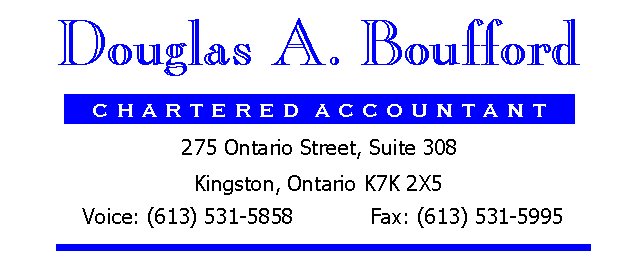|
|
|||||||||||||||||||||||||||||||||||||||||||
|
The federal budget, as tabled on February 18, 2003, contains no new broad-based personal or corporate tax rate changes, but does contain a number of new tax measures, including an increase in the RRSP contribution limits for 2003 and later years, an increase in the small business deduction threshold (from $200,000 to $300,000) in stages over four years, and the phase out of the federal Large Corporations Tax by 2008. Following is a summary of the tax measures as proposed in the budget. Please note that these measures are not yet law and may undergo revisions prior to receiving Royal Assent.
Increase in Small Business Deduction: The small business deduction reduces the basic federal corporate income tax rate to 12% for the first $200,000 of active business income (on an associated group basis) of a Canadian-controlled private corporation (CCPC). The budget proposes to increase the $200,000 small business limit to $300,000 over a four-year period, as follows:
These limits will be pro-rated for non-calendar year-ends and will continue to be reduced for CCPCs having between $10 million and $15 million of taxable capital employed in Canada. When fully phased in, this measure will provide small business with an additional $9,000 per year in annual federal tax savings. For taxation years that begin before 2004, eligible CCPCs will continue to have advance access to the 21% reduced corporate income tax rate on active business income exceeding the small business limit but less than $300,000. Corresponding changes will be made to the rules that allow a CCPC to pay the balance of their corporate taxes at the end of the third month after the end of the taxation year.
Elimination of Federal Capital Tax: Unlike income taxes, capital taxes must be paid even when a corporation is not profitable. The federal capital tax is levied annually at a rate of 0.225% of a corporations taxable capital employed in Canada in excess of a $10 million capital deduction. It is proposed that the federal capital tax will be phased out gradually over a five-year period, with an immediate elimination (for all taxation years that end after 2003) for corporations with less than $50 million in taxable capital. The increased $50 million threshold will apply to all taxation years that end after 2003, and will not be prorated. Additionally, the current .225% rate of tax will be reduced in stages over a period of five years as follows:
These rates will be prorated for taxation years that do not coincide with the calendar years. Rollover of Investments in Small Business: The budget proposes to enhance the capital gains rollover rules that allow individuals to defer recognition of some or all of their capital gains arising on the disposition of an eligible small business investment when the proceeds received are reinvested in other eligible small businesses. Currently the deferral is only available with respect to the first $2 million of the individuals original investment. There are no limits on the total amount that can be reinvested, but no more than $2 million reinvested in shares of any particular company or related group currently qualifies for the deferral. The budget proposes to eliminate the $2 million limit on original and reinvested amounts for purposes of the deferral. The budget also proposes to extend the period in which a reinvestment qualifying for the deferral may be made. A reinvestment will be eligible provided it is made at any time in the year of disposition or within 120 days after the end of the year. These changes will apply to dispositions that occur after February 18, 2003. Automobile Benefits and Deductibility Limits: This budget also proposes to reduce taxable benefits in relation to employer-provided automobiles, as well as, ease the restrictions on the deductibility of automobile expenses in certain circumstances. For 2003 and subsequent taxation years, a reduced standby charge will apply to the extent annual personal driving does not exceed 20,000 kilometres (up from 12,000) and the automobile is used primarily (more than 50%; down from 90%) for employment purposes. There will also be a complete exemption from the automobile benefit and expense provisions for clearly marked police and fire emergency vehicles. In addition, for taxation years that begin after 2002, extended cab pickup trucks used at remote or semi-remote work sites will be excluded from the standby charge, operating expense and automobile expense provisions. Reduction in EI premium rate: It is proposed that the EI premium rate will be reduced from the current 2003 rate of $2.10 per $100 of insurable earnings to $1.98 for 2004. The maximum insurable earnings will remain at $39,000. The employers share of premiums remains at 1.4 times the premium payable by employees. In addition, provided that certain conditions are met, individuals will be entitled to a six week EI compassionate family care leave benefit to care for their gravely ill or dying child, parent or spouse.
Personal Measures Increase in RRSP and RPP limits : As expected, increases in contribution limits for registered retirement savings plans (RRSPs), money-purchase registered pension plans (RPPs) and deferred profit-sharing plans (DPSPs) were announced in this budget. The current $13,500 RRSP contribution limit, which has been frozen since 1996, will be increased to $18,000 over four years, as follows:
There will be corresponding increases to the maximum limits for money purchase and defined benefit pension plans. Payouts from Money Purchase RPPs: It is proposed that money purchase RPPs will be allowed to pay pension benefits in the form of the same income stream currently allowed under a RRIF. A member will be required to withdraw a minimum amount from their money purchase account each year beginning no later than the year in which they attain age 70. Former members who have previously transferred their money purchase account to an RRSP or RRIF will be allowed to transfer the funds back into a pension plan. These proposals will apply after 2003. Additional Retirement Savings Measures: The government announced that it will engage in consultations to assess the appropriateness of encouraging retirements saving by introducing "tax pre-paid savings plans" (TPSP). Though structured differently from RRSPs, TPSPs are savings vehicles that increase the after-tax return on savings as compared to unregistered plans. Under a TPSP, no deduction would be provided on contributions, but the investment income in the plan and withdrawals would not be subject to income tax. Enhancements to the National Child Benefit Supplement (NCB): This supplement will be increased by an annual amount of $150 per child in July 2003, $185 in July 2005 and an additional $185 in July 2006. With these increases, the maximum annual Canada Child Tax Benefit (CCTB) will reach $3,243 for the first child by 2007, $3,016 for the second and $3,020 for each additional child. In 2003, the family income threshold at which the supplement if fully phased out and the CCTB base benefits begin to be phased out is $33,847. New Child Disability Benefit: Effective July 2003, there will be a new $1,600 supplement to the CCTB for low and modest income families with disabled children. Eligibility for this income-tested benefit will be based on the same criteria used for the disability tax credit. The full $1,600 supplement will be provided for all families with disabled children who currently receive the NCB supplement, those families with incomes of less than $33,487 for 2003. Beyond that income level, the benefit will be reduced. Additional Eligible Expenses for the Medical Expense Tax Credit: The list of eligible medical expenses will be expanded to include:
Disability Tax Credit: The disability tax credit (DTC) provides relief to individuals with severe or prolonged mental or physical impairment. Three measures relating to the DTC have been proposed:
Other Measures Deductibility of Interest and Other Expenses: Recent Court decisions have expanded the circumstances under which an interest deduction may be claimed by taxpayers beyond what the Department of Finance considers is reasonable under an objective tax system. The Department of Finance will consider legislative amendments to ensure that deductions allowed for tax purposes will be consistent with appropriate tax policy. Cross-Border Share Exchanges: After the 2000 Economic Statement, the government studied methods that would allow cross-border share exchanges to take place on a tax deferred basis. Proposals have been drafted and will be released for public comment shortly. Film and Video Productions Services Tax Credit: The budget proposes to increase the existing 11% credit rate to 16% of qualified Canadian labor expenditures, applicable to expenditures incurred after February 18, 2003. Air Travelers Security Charge Reduced: A reduction in the Air Travelers Security Charge on domestic flights will apply on March 1, 2003. The charge for domestic air travel will be reduced from $12 to $7 for one-way travel and from $24 to $14 for round-trip travel.
|

